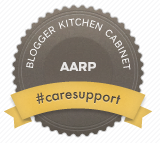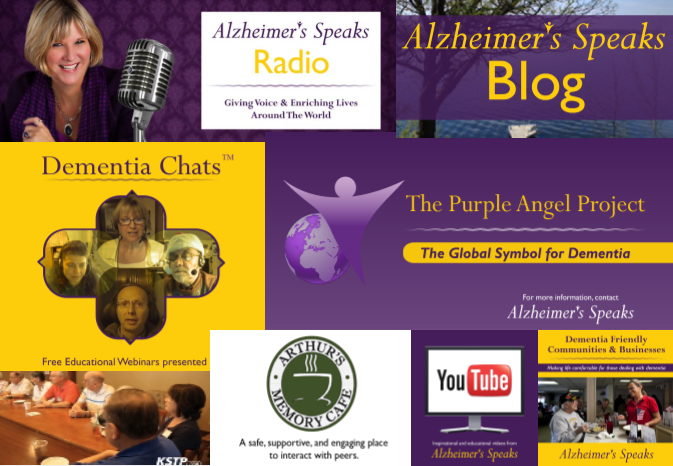Helping Those That Care Cope – Creating Joy for Those Living With Dementia
 This post is supported by AARP’s Caregiving Resource Center.
This post is supported by AARP’s Caregiving Resource Center.
All opinions are my own
Helping Those That Care Cope –
Creating Joy for
Those Living With Dementia
By Lori La Bey, founder of Alzheimer’s Speaks
Creating joyful moments is one of the major goals most people have when getting together during the holidays. Holding onto family traditions to create beautiful memories can be blissful and stressful all at the same time. How did you your Thanksgiving go?
Stepping Back To See What Actually Brings Joy VS.
Doing What’s Always Been Done Can Make a Difference
You see, when the person with dementia is unhappy or uncomfortable; those that care for them feel stressed as well. Care partners must accept the fact that needs and abilities of the person they are caring for may change or decline. What used to bring them joy, may no longer work. It is important for carers to reassess what makes the one they are caring for comfortable, safe and happy.
Below are some examples of things to
consider during the holiday season:
Environment
It’s important to know where and when a person with dementia feels most comfortable.
· It is at home?
· Out in their community?
· At a relatives or friends home?
Going out for dinner or a party which once was enjoyable, can cause panic and confusion as the disease progresses. Things like, just placing an order can be overwhelming and embarrassing for a person with dementia. Knowing your persons mobility needs, eating and toileting habits can help in a new setting. Here are a few things to investigate up front:
· Location of the rest rooms
· Parking accessibility
· Walking distance
· Find out if chairs have arm rests or if they are on rollers
· Checking the menu to plan ahead for what they might like
The more prepared you can be, the better the experience will be for both of you.
Have you noticed large gatherings with family and friends have changed? Do they trigger:
· Frustration
· Anxiety
· Confusion
· Withdrawn behavior
· Wandering behavior
If so, try breaking large gatherings into several small celebrations. This way the person with dementia can still get together with those that are important to them, with less distractions and irritants to create a better environment for them to engage and interact.
Noise Levels
How do they react to various noise levels? Are they bothered by loud, high pitched or low tones causing a change in their mood? If so, being conscious of such can be extremely valuable to all and many times is easy to control. If you are out at a restaurant, ask the wait staff if the background music be turned down or if you are sitting next to the kitchen which can sometimes add to background noise, ask for a table in a quieter location…
Be conscious of background noise like television, music and multiple conversations. These can be very disruptive for a person with dementia causing anything from them becoming withdrawn because they can’t understand conversation, all the way to physical aggression.
Make note of high ceilings which can cause an echoing effect causing confusion and frustration if there are no absorption panels.
Ask people to speak, one at a time, and look directly at the person with dementia when they talk. Our nonverbal communication is over 75% of how we understand and interpret what is being said. Being conscious of nonverbal communication is an extremely helpful and a respectful way to communicate with people who have dementia.
Have you noticed a mood change when the TV is on? This is common as the disease progresses. As a person with dementia goes through various stages of the disease, they may no longer be able to follow a program or understand when there is something disturbing on the news. They can’t always distinguish if it is real and if they are in danger or not. Turn the channel or turning the TV off can remedy this.
Music can be a powerful tool as long as it is the type of music the person with dementia likes. Please note that music is tied to memories, so it can trigger things like joy and sadness or a variety of other emotions. It is critical to know what your person likes and doesn’t care for. Here are a couple links to great videos showing the power of music even in later stages. Alive Inside.
Lighting
Have you ever noticed the effect light has on your person with dementia? It’s amazing the various types of behaviors light can cause. For example, improper lighting can cause paranoia which can be triggered by glare or not enough light with shadows. Keep in mind as people age they need more light to be able to differentiate colors and shapes. Studies on light have also proved to improve people’s moods.
Blinking and flashing lights can also cause over stimulation, triggering confusion and increase anxiety. Sometimes it’s best to go with the theory “less is more” around the holidays. This goes for decorations and holiday lights.
Temperature
Keep in mind, high ceilings can also effect room temperature as heat rises. It’s always good to know the natural body temperature of the person you are caring for. Are they usually hot or cold or does their temperature seem to fluctuate? If so, have them wear layered clothes to keep them comfortable at all times.
Time of Day
Have you noticed that at certain times of the day the person you are caring for is more alert and engaged? If so, having gatherings or appointments at these times will make the visits more enjoyable for all. Also, make sure the time of day for event works for you the care partner as well. Keeping both of you feeling comfortable and engaged is important.
Length of Gathering
Have you noticed how long your person with dementia likes to partake in certain activities or be with certain people? Knowing and respecting their limits will bring comfort and joy to both of you. Would having an area to escape to for some quiet time help extend the length of time they can participate in an event? Giving them a break from a large group or different environment can be calming. So check and see if there is space to accommodate such.
Travel
Is your loved one with dementia comfortable traveling? Here are some things to consider:
What is the best mode of transportation for them and for how long?
- Car (are there specific types of vehicles that are easier for them to get in and out of?)
- Train
- Plane
- Bus
When a trip is planned when do you inform them so anxiety doesn’t increase? Many care partners find giving less notice is best for people with dementia as the disease progresses. Their sense of time can diminish and they will repeatedly ask when they are going…
If staying overnight somewhere, do you see increased confusion or withdrawal? Staying in a strange place can cause a lot of panic. Here are a couple of ideas.
- Bring night lights in case they wake up and move around in the dark.
- Leaving bathroom doors open and lit assisting them to be as independent as possible.
- Remove throw rugs they are a fall hazard.
- Do you have precautions in place to prevent wandering?
- Discussing where and why you are going someplace may be helpful, but not remembered by the person you are caring for. If they are still able to read writing it down for them could be helpful.
- Have ID bracelets for both the person with dementia and their care partner can be critically important.
- Implementing a GPS system to track in an emergency can also be a wonderful safe guard.
- Having emergency contact and medical information with you is wise.
- If you have a cell phone or camera take a daily picture of what they are wearing. You don’t need to tell them it’s in case they get lost. Make it about creating a memory of your trip!
- Knowing your schedule is critical so you can line up support help if you need to take a break or go someplace alone.
These are just a few tips I have learned during my thirty year journey with my own mother and her dementia. I hope you find them helpful. To get more tips about living with dementia check out Dementia Chats™, where the experts have been diagnosed with the disease. These are free webinars where participants are able to join the conversation and get their questions answered.
Share Your Ideas and Stories at AARP’s I Love Caregivers
For Additional Resources for
Living with Dementia or Caregiving
Click Below




Thank you Lori! So very well put together!
Thank you Jane. Keep up the great work you are doing with the Purple Angel!